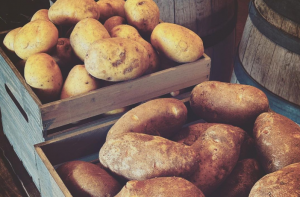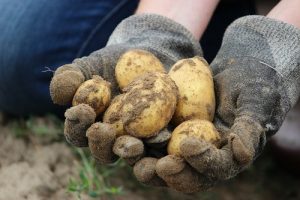New Crops of Organic Potatoes Hitting Retailers
Several states are digging and shipping new crops of organic potatoes, and there is potential for promotions, especially with organic russets, according to a report from the Organic Produce Network.
“We have just started to harvest field-run organic russet potatoes, and we will continue to run out of the field until the first or second week of October,” said Lonnie Gillespie, chief organic officer for Farm Fresh Direct of America in Monte Vista, Colorado. “We’re keeping our fingers crossed that by then we will be able to start shipping organic potatoes from storage. You never know what mother nature is going to do.”
Gillespie noted that while harvest is underway, potatoes can withstand normal weather patterns, but it is out-of-the-ordinary conditions that cause issues. “Extreme anything is a problem,” she said, speaking of either heat or cold. “At this time of the year, we don’t want it to be extremely cold or wet.”
But for the time being, Gillespie said the crop looks good, and Farm Fresh Direct could support some retail promotions featuring field-run organic russets. The company has a full line of organic yellows, reds, and russets available, but the yellows and reds are currently coming from the Pacific Northwest and are in lighter supply. She also noted that Farm Fresh will be offering some organic russets from Minnesota shortly.
“In the spring and early summer, we had some shortages and higher prices on all potatoes, but there is no shortage right now, and this new crop does look like it’s going to be more of an average crop,” Gillespie said.
Most of the current chatter about the new crop of conventional Idaho and Eastern Oregon potatoes currently being harvested points to a larger crop and a return to more normal FOB prices, Gilliespie said, rather than the higher prices that have been part of the landscape for the past couple of years.
Nate Jones of King’s Crown Organic Farm in King Hill, Idaho, said Idaho had excellent growing weather throughout the spring, which has led to an organic potato crop that is larger than the last two years.
“We grow four different varieties,” he said, adding that their organic acreage includes russets, yellows, reds, and purples. “The Norkotah (a russet variety) produced an awesome crop of good-sized potatoes, and the yellow crop is also very good. We are getting good yields on both of those potato varieties. The reds and purples didn’t size as well, and the yields are a little bit below average.”
While the conventional acreage of potatoes across the country is up a few percentage points, Jones does not believe that there has been an uptick in organic acreage. “Organic potatoes are not a crop that you go in and out of,” he said. “There are only a handful of us that grow organics (in Idaho), and our acreage is pretty steady.”
“We will also have more organics, but demand for organics remains fairly strong,” he said, adding that organic potatoes don’t tend to be promoted very often. “But there could be some opportunities for promotable pricing during the year.”
While there will be more organic supplies total, Beck said there might not be enough to carry throughout the entire storage season. That good demand, he said, will create some supply challenges toward the end of the season.
Beck said the organic potato consumer is a bit different than the shoppers who mostly buy conventional potatoes and will increase their purchase when the price is lower and the value is greater. The organic buyer is typically buying the category for philosophical reasons and is not driven as much by the value proposition that potatoes typically offer.
For more news of interest to the specialty food industry, subscribe to Gourmet News.







